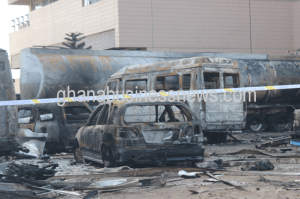Coalition advocates amendment of NADMO Act

The Ghana Coalition of non-governmental organisations (NGOs) in Health (GCNH), at the weekend advocated urgent amendment of the Legislative Instrument that established the National Disaster Management Organisation (NADMO).
According to the group, the NADMO Act 517, 1996, is old and does not correspond to addressing the current national disaster crisis, in the areas of planning, management, urban growth and human protection mechanism.
A statement signed by Mr Gabriel Gbiel Benarkuu, the National Chairman of the GCNH, and made available to the Ghana News Agency in Sunyani, said a national comprehensive disaster, health, safety and psychotherapy relief policy is needed in the management of national disaster.
Such a policy, the statement observed would inform the amendment of the Act saying the NADMO Act is not relevant and does not respond to the current situation because Ghana’s population was less than 19 million when it was enacted”.
It noted the then national consultation that led to the enactment of the NADMO Act was restricted, as civil society organisations (CSOs) were not allowed to make inputs.
Hence NADMO is struggling to engage CSOs holistically in disaster planning and management, the statement indicated.
It observed that in the past six months there have been human rights violations, poor approaches and administration of disasters support services to victims affected by floods, fires, demolitions and forceful evictions.
“As a country, we have not attached seriousness or professional approach to the situations because our laws or policies are not adequately addressing the current human settlement and protection issues,” the statement contended.
It added that over the past few decades, social actors in the country had turned attention to flood hazard mitigation to reduce losses.
It said after the floods of July 1995, a number of measures were adopted to mitigate flood hazards.
Despite increasing mitigation efforts, human vulnerability to flooding, disasters and demolition continue increase in the country.
The statement said that the recent national power crisis has made majority of Ghanaians prone to disasters at home, work places and the general environment.
It noted that the country has experienced disasters of very great proportions and the cumulative effects of floods, rainstorms and windstorms have caused havoc in about 950 communities nationwide.
Damages and destruction included 20,000 acres of farmlands and 14,899 collapsed houses, and a number of bridges and roads have been washed away.
The statement said 744 schools were destroyed and more than 228,000 people affected with 51 per cent of the affected people being children and 26 per cent being women.
“This clearly demonstrates that children and women are the most vulnerable in the society when national disasters occur.”
The statement recounted that in the first quarter of 2012, 1,942 people were affected by serious rainstorms and therefore called on the government to come out with clear guidelines on the effective coordination of the National Disaster Relief Fund.
The statement observed that the June 3 disaster in Accra which left more than 150 people dead exposed the deficiencies in the planning and development of cities.
It therefore challenged the government, especially the various select committees on environment, disaster and relief to initiative to ensure an urgent review of the NADMO Act.
The GCNH is a not-for-profit CSO established in 2000 as an umbrella and coordinating body of activities of all registered NGOs and community based organisations in the health sector.
It currently has a membership of 417 registered local CSOs with regional branches.
Source: GNA
